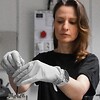Fritextsökning
Artiklar per år
Innehållstyper
-

Innovative start-up helps doctors, scientists and industry balance coagulation risks
For many doctors caring for seriously ill patients, for example, in stroke units and cancer wards, maintaining the life-saving balance between bleeding and thrombosis is an ongoing challenge. In the late 1980s, scientists at Maastricht University in the Netherlands developed an innovative method, the thrombin generation assay (TGA), which provides a complete overview of a physiological process crucial for maintaining normal haemostasis.
-

“Conducting research at universities is becoming more and more like working at a research hotel”
The government wants Swedish research to focus on excellence and innovation, but can the two be combined? Life Science Sweden talks to Anna Falk, a professor at Lund University, about research policy, the constant hunt for funding in academia and what constitutes ‘fine research’.
-

Carl Borrebaeck – professor and serial entrepreneur with a taste for speed
Award-winning cancer researcher, the founder of many listed companies, and constantly in the academic and commercial spotlight for decades. However, Carl Borrebaeck, Professor of Immunotechnology at Lund, is not yet satisfied. “We have a new, potentially super exciting project in the pipeline,” he says.
-

Över 250 sajter stängdes efter försäljning av falska fetmaläkemedel
Över 250 webbsajter stoppades i fjol efter att ha marknadsfört förfalskade versioner av populära diabetes- och fetmaläkemedel av typen GLP-1-analoger.
-

Ny vd för Boule Diagnostics
Diagnostikbolaget Boule Diagnostics har nu rekryterat en ny vd. Torben Nielsen efterträder Jesper Söderqvist som lämnar sin tjänst i mitten av april.
-

Raised millions to develop a treatment for ´butterfly children´
Fragile as a butterfly’s wing – that’s how people living with Epidermolysis Bullosa are usually described. The Lund-based company Xinnate recently raised SEK 100 million in a new share issue to finance the development of a treatment they hope will give those affected an improved quality of life.
-

A new special edition and a new event in Copenhagen – This is happening at Life Science Sweden 2024
The new year brings new features for the readers of Life Science Sweden.
-

High-tech companies are increasingly focusing on health
Tech companies have been taking an interest in healthcare for many years, and this interest seems to be increasing. “It’s not a sudden shift in trend, it’s more about them advancing their positions,” says Anna Lefevre Skjöldebrand, CEO of Swedish Medtech.
-

The first drugs to slow down Alzheimer’s – but what does it mean for patients?
New treatments for early Alzheimer’s are bringing hope to thousands of patients and their families. The question is, who will get the treatment, how will the right patients be found in time, and will the healthcare system’s resources be sufficient? Life Science Sweden has spoken to Swedish researchers in Alzheimer’s who voice cautious hope but also see further challenges.
-

Astra Zeneca’s Sweden CEO: “We have great faith in our portfolio”
It all started with a summer job as an operator at Astra’s chemical factory in Snäckviken, just outside Södertälje. More than three decades and countless different assignments later, Per Alfredsson, born and raised in Södertälje, is CEO of Astra Zeneca Sweden, which employs 7800 people in Södertälje, Stockholm and Gothenburg. “It was a very special feeling to be in charge of the entire organisation,” he says in an interview about his career and potential future blockbusters.
-

Astra Zenecas Sverige-vd: ”Vi tror superstarkt på vår portfölj”
Det började med sommarjobb som operatör på Astras kemifabrik i Snäckviken. Över tre decennier och otaliga olika uppdrag senare är Södertäljesonen Per Alfredsson vd för hela Astra Zeneca Sverige, som samlar 7 800 anställda i Södertälje, Stockholm och Göteborg. ”Det var en väldigt speciell känsla att bli chef över hela verksamheten”, säger han i en intervju där han berättar om sin karriär – och om kommande potentiella blockbusters.
-

Larm: Varningsnätverk för globala sjukdomsutbrott kan kollapsa
Varningssystemet för sjukdomsutbrott, Pro Med, som bland annat var en av de första att varna världen om covid-19 tycks vara nära kollaps.
-

”Jumping genes” öppnar väg för ny behandling mot cancer
Alternativa sätt att hitta tumörantigen på tumörcellens yta kan bidra till att ta fram ny immunterapi.
-

Column: ”Authentic leadership and clear mandates pave the way for more female CEOs”
”I believe that the aspect of having clear mandates and titles on the one hand and women progressing into top positions must be explored further”, Helena Strigård writes in a column.
-

Column: ”We need to exploit the benefits of the regulations“
You don’t need to search long on the Internet to find lists of the most innovative countries with Sweden ranking at the top. Sweden generally offers good conditions for growing new solutions, but it is also becoming increasingly clear that we are challenged in one area – regulations, writes Björn Arvidsson in a column.
-

KI får 46 miljoner kronor från Barncancerfonden
Barncancerfonden delar ut 140 miljoner kronor under december till barncancerforskning. Karolinska institutet är den största mottagaren med 46 miljoner kronor.
-

Great Swedish innovations: Eye treatment became a feather in Pharmacia’s cap
From complicated and sometimes risky surgery to a routine procedure. Pharmacia’s injectable Healon revolutionised the field of eye surgery - and is considered by us one of the most important contemporary Swedish innovations in the field of medicine.
-

Ny Sverigechef till Boehringer Ingelheim
Australiensaren Paul Dunesky har arbetat inom Boehringer Ingelheim sedan 2013 – nu blir han Sverigechef.
-

He is zooming in on topical preparations
According to Zelmic CEO David Sagna, topical products in drug development is a growing market, and to keep pace with the development, the company is awaiting approval for its new GMP facility.
-

“We aim to be a start-up company with an academic spirit”
Chronic pain and Alzheimer’s are two diseases that plague many people worldwide and seem impossible to cure. However, Huddinge-based company Alzecure is working on developing drugs for both conditions.
-

Biosimilars bring price pressure, but are they sufficiently used?
When biosimilars were introduced just over 16 years ago, hopes were raised that they would give many more patients access to effective but otherwise extremely expensive treatments with biological drugs. So, how well has Swedish healthcare used biosimilars? The answer partly depends on whom you ask.
-

Amorphous materials take centre stage when Orexo develops new formulations
Swift resolution but with maintained stability. Orexo’s new drug delivery platform tackles the problem of amorphous materials. “Our technology has the positive properties of the material, and it also cracks some of the problems,” says the company’s Research and Development Manager Robert Rönn.
-

Ny metod för mikroskopi öppnar genväg till nya läkemedel
Forskare vid Chalmers har utvecklat en helt ny mikroskopiteknik för att kunna studera de minsta biologiska partiklarna i sitt naturliga tillstånd – och därmed öppna vägar för snabbare utveckling av nya läkemedel och vaccin.
-

The first vaccine derived from cowpox
The British rural doctor could not forget the words of the peasant girl. Could that really be true? A couple of decades later, on 14 May 1796, he performed the world’s first smallpox vaccination, and a medical breakthrough had occurred.